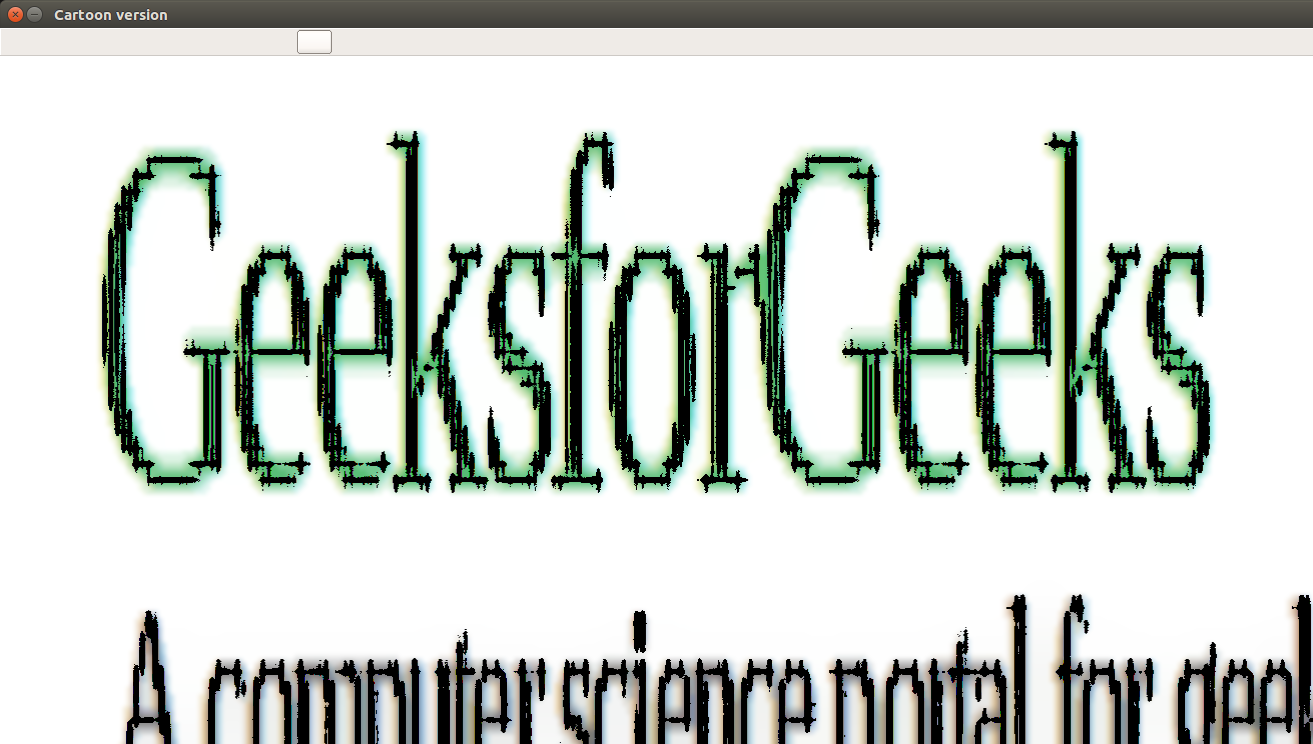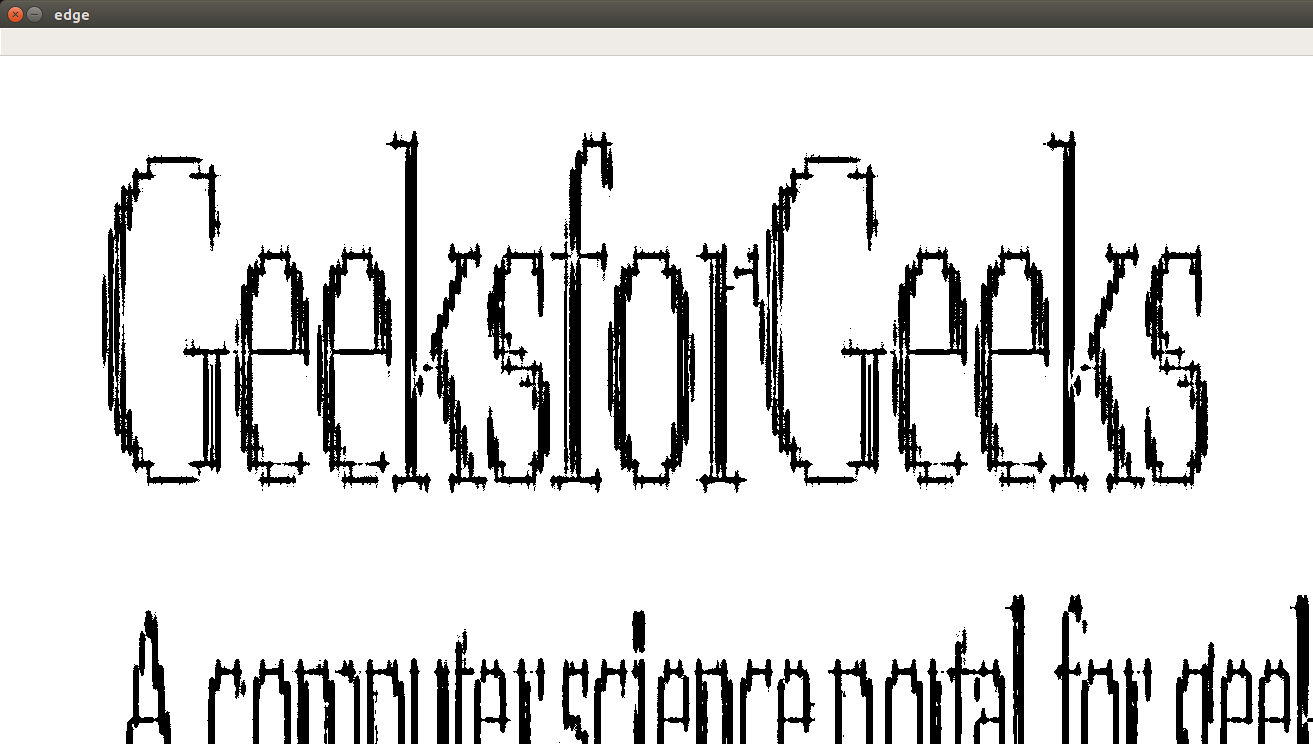使用 OpenCV 对图像进行卡通化 - Python
如您所知(或者即使您不知道),计算机视觉是一个非常强大的工具,具有巨大的可能性。所以,当我准备准备一部关于我朋友大学生活的漫画时,我很快意识到我需要一些东西来减少我实际绘制它的努力但又能保持质量,我想出了以下解决方案。
我们先看看结果——
 原始图像
原始图像

漫画版

从图像中获得的边缘(自适应阈值结果)
让我们看看代码:
class Cartoonizer:
"""Cartoonizer effect
A class that applies a cartoon effect to an image.
The class uses a bilateral filter and adaptive thresholding to create
a cartoon effect.
"""
def __init__(self):
pass
def render(self, img_rgb):
img_rgb = cv2.imread(img_rgb)
img_rgb = cv2.resize(img_rgb, (1366,768))
numDownSamples = 2 # number of downscaling steps
numBilateralFilters = 50 # number of bilateral filtering steps
# -- STEP 1 --
# downsample image using Gaussian pyramid
img_color = img_rgb
for _ in range(numDownSamples):
img_color = cv2.pyrDown(img_color)
#cv2.imshow("downcolor",img_color)
#cv2.waitKey(0)
# repeatedly apply small bilateral filter instead of applying
# one large filter
for _ in range(numBilateralFilters):
img_color = cv2.bilateralFilter(img_color, 9, 9, 7)
#cv2.imshow("bilateral filter",img_color)
#cv2.waitKey(0)
# upsample image to original size
for _ in range(numDownSamples):
img_color = cv2.pyrUp(img_color)
#cv2.imshow("upscaling",img_color)
#cv2.waitKey(0)
# -- STEPS 2 and 3 --
# convert to grayscale and apply median blur
img_gray = cv2.cvtColor(img_rgb, cv2.COLOR_RGB2GRAY)
img_blur = cv2.medianBlur(img_gray, 3)
#cv2.imshow("grayscale+median blur",img_color)
#cv2.waitKey(0)
# -- STEP 4 --
# detect and enhance edges
img_edge = cv2.adaptiveThreshold(img_blur, 255,
cv2.ADAPTIVE_THRESH_MEAN_C,
cv2.THRESH_BINARY, 9, 2)
#cv2.imshow("edge",img_edge)
#cv2.waitKey(0)
# -- STEP 5 --
# convert back to color so that it can be bit-ANDed with color image
(x,y,z) = img_color.shape
img_edge = cv2.resize(img_edge,(y,x))
img_edge = cv2.cvtColor(img_edge, cv2.COLOR_GRAY2RGB)
cv2.imwrite("edge.png",img_edge)
#cv2.imshow("step 5", img_edge)
#cv2.waitKey(0)
#img_edge = cv2.resize(img_edge,(i for i in img_color.shape[:2]))
#print img_edge.shape, img_color.shape
return cv2.bitwise_and(img_color, img_edge)
tmp_canvas = Cartoonizer()
file_name = "Screenshot.png" #File_name will come here
res = tmp_canvas.render(file_name)
cv2.imwrite("Cartoon version.jpg", res)
cv2.imshow("Cartoon version", res)
cv2.waitKey(0)
cv2.destroyAllWindows()
解释:
基本上,我们将使用一系列滤镜和图像转换。
- 首先我们缩小图像,然后应用双边过滤器来获得卡通风格。然后我们再次放大图像。
- 下一步是获取原始图像的模糊版本。现在,我们不希望颜色干扰这个过程。我们只想要边界的模糊。为此,我们首先将图像转换为灰度,然后应用媒体模糊滤镜。
- 下一步是识别图像中的边缘,然后将其添加到先前修改的图像中以获得素描笔效果。为此,我们首先使用自适应阈值。您也可以尝试其他类型的阈值技术。因为计算机视觉就是关于实验。在第 5 步中,我们编译从前面的步骤中获得的最终图像。
更简单的实现——
# importing libraries
import cv2
import numpy as np
# reading image
img = cv2.imread("koala.jpeg")
# Edges
gray = cv2.cvtColor(img, cv2.COLOR_BGR2GRAY)
gray = cv2.medianBlur(gray, 5)
edges = cv2.adaptiveThreshold(gray, 255, cv2.ADAPTIVE_THRESH_MEAN_C,
cv2.THRESH_BINARY, 9, 9)
# Cartoonization
color = cv2.bilateralFilter(img, 9, 250, 250)
cartoon = cv2.bitwise_and(color, color, mask=edges)
cv2.imshow("Image", img)
cv2.imshow("edges", edges)
cv2.imshow("Cartoon", cartoon)
cv2.waitKey(0)
cv2.destroyAllWindows()
你可以做什么?
实验!尝试更改下采样步骤,或应用双边滤波器的数量,甚至是滤波器的大小,或获取边缘的阈值技术。现在,要记住一件事。此过程是一个通用过程,不会为不同的图像提供最佳结果。这就是为什么,你应该尝试不同的值来感受整个过程。
这都是我这边的!奥夫·维德森!
关于作者:
Vishwesh Shrimali是 BITS Pilani 的本科机械工程专业学生。他满足了他的分支中没有教授的所有要求——白帽黑客、网络安全运算符和前竞争程序员。作为Python力量的坚定信徒,他的大部分工作都是用同一种语言编写的。每当他除了编程、上课、看 CSI Cyber 之外,还有一些时间,他就会去散步,默默地弹吉他。他的人生格言是——“享受你的生活,因为它值得享受!”
如果您还想在这里展示您的博客,请参阅 GeeksforGeeks 上的客座博客文章 GBlog。